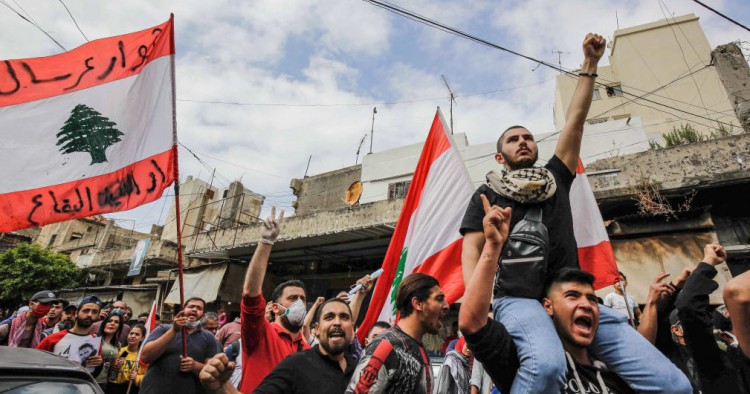The men who rule Lebanon are fighting over who has the best economic rescue plan for the country. The government agreed on a five-year plan on April 30, and on May 1 Lebanese officials signed a request for assistance from the International Monetary Fund (IMF). The overseers of Lebanon’s gradual descent into the economic abyss over the last 30 years did not like the plan, however. The Future bloc, headed by Saad Hariri, and the Lebanese Association of Banks said they will come up with their own alternatives. This is a last-ditch attempt by the Hariri-led bloc to defend and preserve an economic model ushered in by the late Rafik Hariri in the 1990s. The banking sector, which long enjoyed a primus inter pares role in the Lebanese political system, is also trying to protect its privileges.
On May 4, Hezbollah Secretary-General Hassan Nasrallah commented for the first time on the government plan, arguing it is “the first step on the path to economic recovery.” Despite early indications by Hezbollah officials that they opposed an IMF role in Lebanon’s economic recovery, the party had no choice but to change course. Three factors explain their decision. First, Iran requested IMF assistance as well, making it harder to argue against the IMF when the party’s main patron had also sought its help. Second, the Lebanese economy is deteriorating rapidly. Officials are now saying 75 percent of the population is in need of assistance, including food aid. Hezbollah strongholds are experiencing the same economic hardships as the rest of the country, and the party’s finances are not as strong as they used to be before the Syria war and U.S. sanctions on Iran. Third, after internal deliberations, Hezbollah leadership realized there is no longer a pathway to international economic assistance that excludes an IMF role.
President Michel Aoun called for a May 6 meeting of leaders of the parliamentary political blocs to discuss the government reform plan. The Future bloc announced its boycott of the meeting, arguing this move by the president infringes on Parliament’s functions and paves the way to establishing “a presidential system.” While Parliament Speaker Nabih Berri, long known for his dislike of Aoun and his son-in-law Gebran Bassil, did not approve of Aoun’s move, seeing it as an infringement on his turf, he is unlikely to follow suit. The Progressive Socialist Party led by Walid Jumblatt, a Hariri ally, announced they would attend the meeting and present their comments on the government plan.
This is the beginning of the process for Lebanon’s government to negotiate its way out of this unprecedented economic crisis. The reforms that will be required by the international donor community to come to Lebanon’s aid are going to have high political costs that to date Lebanon’s leaders have refused to incur. The protest movement launched last October is now restarting as the COVID-19 lockdown measures have eased. As more Lebanese join the ranks of the unemployed and the hungry, including middle-class families, the protest base will expand.
As economic conditions worsen, expect Lebanese politicians to engage in the blame game, in the hope they can deflect attention from their responsibility for the dismal state of affairs the country is in. Last week witnessed a back-and-forth between the Lebanese prime minister and the governor of the Central Bank, with the former seeking to lay the responsibility for the fiscal crisis at the latter’s doorstep, arguing the governor’s financial engineering schemes are to blame for the dire economic conditions. In a televised speech, the governor argued the responsibility lay with budget policies enacted by political leaders and not with him or the Central Bank.
It is not yet clear who will emerge as the winners and the losers from this latest crisis in a country that has experienced so many. In the past the political class has always found a way to resist pressure and stay in power. Previous calls for political and economic reforms went unheeded. The protest movement is a factor to be reckoned with in any analysis of future scenarios for Lebanon. Yet the lack of a unified leadership remains a major handicap denying the movement a role at the negotiation table for discussions over the country’s economic future.
Randa Slim is a Senior Fellow and the Director of MEI’s Conflict Resolution and Track II Dialogues Program. The opinions expressed in this piece are her own.
Photo by IBRAHIM CHALHOUB/AFP via Getty Images
The Middle East Institute (MEI) is an independent, non-partisan, non-for-profit, educational organization. It does not engage in advocacy and its scholars’ opinions are their own. MEI welcomes financial donations, but retains sole editorial control over its work and its publications reflect only the authors’ views. For a listing of MEI donors, please click here.













